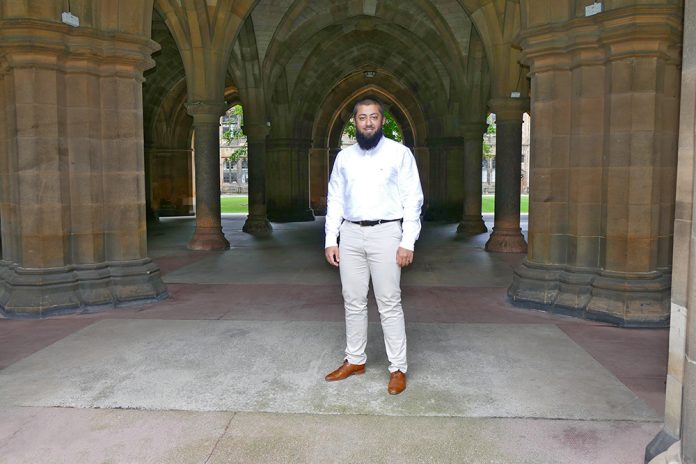Taking the time out to do a Master of Business Administration degree can broaden horizons and support a change in direction. HELEN COMPSON talks to one former University of Glasgow student who relishes the new mind-set it gave him.
For Zeshan Asif, the MBA course at University of Glasgow Adam Smith Business School proved to be a stepping stone to a new job with the most global of companies, Amazon itself.
Indeed, having been appointed operational leader for one of the company’s multiple new ‘heavy and bulky deliveries’ distribution depots in the UK, Zeshan was tasked with actually launching his operation in Bathgate on the outskirts of Edinburgh.
He says today of the MBA he gained in 2018: “The course enabled me to recognise ‘me’ as an individual.
“There were all different levels of people on the course in terms of knowledge and experience, which provided a good bit of self-reflection – I could see clearly where I stood in relation to my own experience and qualifications.
“The personal/career development aspect was a vital element for me to recognise how I could be of value to any global organisation.”
Zeshan decided to enrol on the MBA course at a time when he was unsure what his next step should be.
Then an operational manager with Royal Mail, he had been with the company for nearly four years, during which time he’d worked his way up from a graduate recruitment scheme – and into something of an impasse.
“I was at a crossroads,” he said. “Royal Mail had been privatised, structural changes were happening and the experiences were good and bad behind the scenes.
“I was 28 years old at the time, married, and I didn’t know what career trajectory to take – I needed something to help me decide what to do next.”
He said one of the biggest strengths of The Adam Smith Business School’s MBA course was just how rooted in reality it was. “In my undergraduate course, 80% of the content was theoretical, but with the MBA, you were learning from real-life examples and experience – it made what you learned so much more applicable and transferrable.”
The group assignment he was allocated, for example, entailed looking at ‘decision making in uncertainty’, specifically within Lehman Brothers leading up to the collapse of the bank in 2008.
“It was an eye-opener!” he said. “We looked at the leadership traits that contributed to the fall of Lehman Brothers and how that, in turn, drove the economic crash.”
They had studied what is known in applied psychology as the dark triad – of narcissism, Machiavellianism and psychopathy – and how destructive the egotism at the heart of all three could be if allowed to operate unchecked in the field of business management.
Zeshan said: “OK, you do have your own values and system of beliefs, but it’s important to realise you are just one part of a whole and there are the values and goals of the people around you to consider.
“It’s not about what you want, it’s about working alongside a team and getting them to work in accordance with the goals of the company.
“It made me realise the type of leader I want to be – and what I definitely don’t want to be!”
Working on a group assignment was in itself part and parcel of the lesson to be learnt. His group, which included the sales director of a paper company and two students from China, had provided a very rewarding cross-section of background and experience.
“The diversity of the year group in general stood out for me,” he said. “Being amongst varying cultures, professions and personalities allowed me to see how I could fit in and contribute to different types of work environment.”
Zeshan joined Amazon after completing his MBA, relocating to Peterborough to become manager of one of the company’s inbound fulfilment centres, part and parcel of the Amazon logistics/delivery arm.
He had been there nine or ten months when he and his wife Arooj became the proud parents of daughter Haleemah.
It was great timing, therefore, when Zeshan was invited to move home to Scotland to set up one of a new-breed of speciality fulfilment centres the company had in mind.
“Edinburgh was the fifth GSF AMXL UK site launched to deal specifically with heavy and bulky items, such as furniture and large television screens and so on,” he said.
“The other stations are all in England so I’m quite proud that we have the USP of being the only one in Scotland, and that I’m site leader.”
It had been a big operation setting up the site, however what might have looked like chaos was anything but.
He laughed. “It was organised chaos! It was actually very well co-ordinated and Amazon being Amazon, there was a lot of support behind the scenes.
“While I was the main focus, the main point of contact, for everyone to come to as we set up, all the credit goes to the projects team working away in the background.”
At the end of the day, he said, it really had been all about team work – both within and outside Amazon. “That’s the thing, you are trying to build strong relationships not only with your colleagues, but with third parties you’re doing business with too.
“It has really strengthened me personally, completing an MBA, because it made me consider both sides of the equation, both sides of the Amazon business relationship.”






